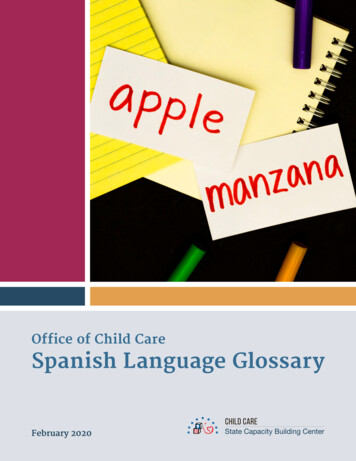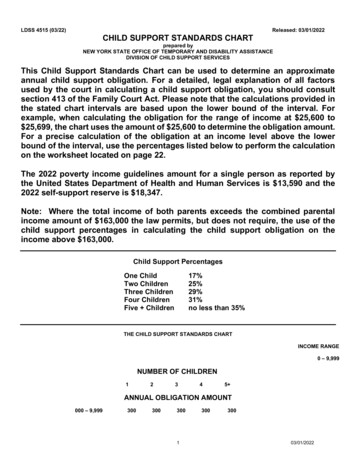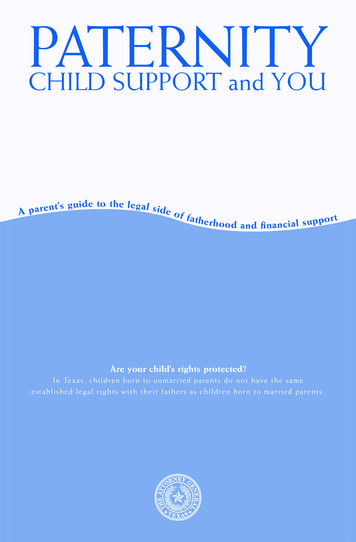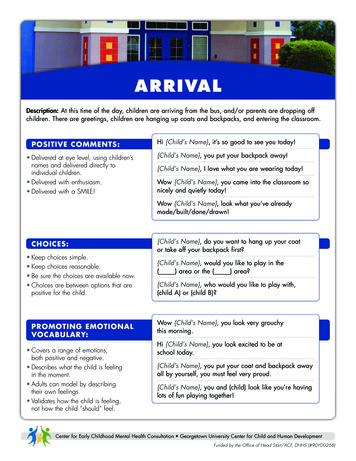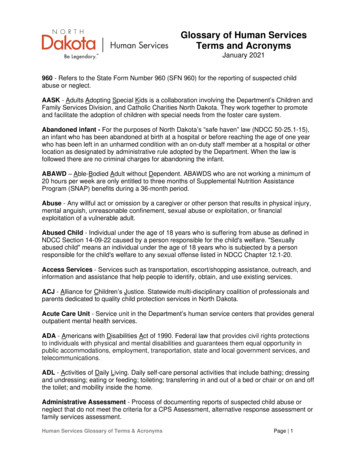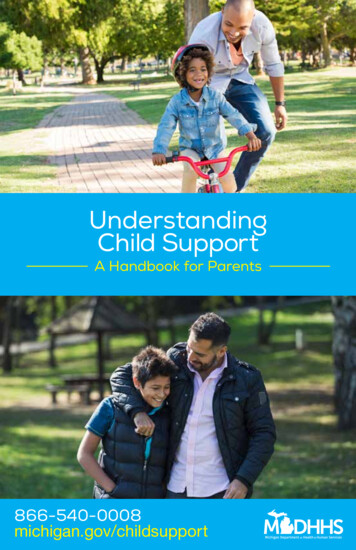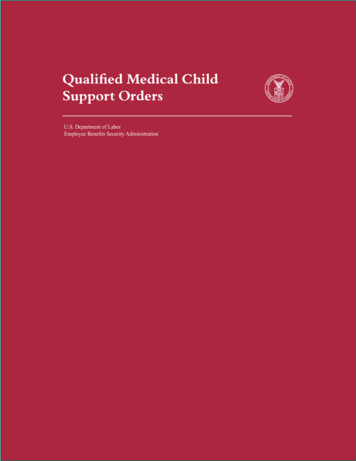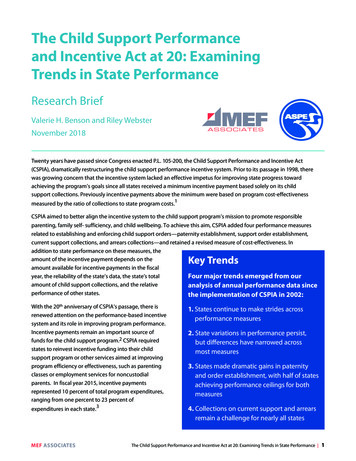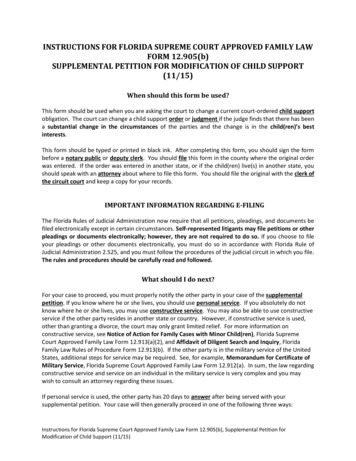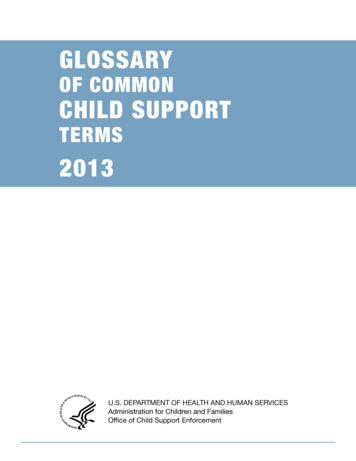
Transcription
GLOSSARYOF COMMONCHILD SUPPORTTERMS2013U.S. DEPARTMENT OF HEALTH AND HUMAN SERVICESAdministration for Children and FamiliesOffice of Child Support Enforcement
Glossary of Common Child Support TermsPREFACEThe purpose of the Glossary of Common Child Support Terms is to providea listing of acronyms and definitions of terms used by child support workers.The glossary is a valuable reference tool to those who are new to child support.It will serve to break down the barriers of communication with other childsupport workers. Communication among caseworkers, state to state andnationwide, is a major key to processing cases and collecting child supportpayments successfully. In addition, the glossary is helpful to both custodial andnoncustodial parents in communicating with the caseworker and to the public atlarge who desire to understand child support better.Office of Child Support EnforcementPage 2
Glossary of Common Child Support TermsAcronymsAcronymACFAdministration for Children and FamiliesAFDCAid to Families with Dependent ChildrenATAction TransmittalCCPAConsumer Credit Protection ActCEJContinuing Exclusive JurisdictionCHIPChildren’s Health Insurance ProgramCPCustodial PartyCSEChild Support EnforcementCSENetChild Support Enforcement NetworkDCLDear Colleague LetterDNADNA or deoxyribonucleic acidDOBDate of BirthDODDepartment of DefenseEDIElectronic Data InterchangeEFTElectronic Funds TransferE-IWOElectronic Income Withholding OrderEVSEnumeration and Verification SystemFCRFederal Case Registry of Child Support OrdersFEINFederal Employer Identification NumberFFCCSOAFull Faith and Credit for Child Support Orders ActFFPFederal Financial ParticipationFIDMFinancial Institution Data MatchFMSFinancial Management ServiceFOPFederal Offset ProgramFPLSFederal Parent Locator ServiceFRCForeign Reciprocating CountryOffice of Child Support EnforcementPage 3
Glossary of Common Child Support TermsAcronymFSAFamily Support ActFVIFamily Violence IndicatorGSAGovernment Services AdministrationHHSUnited States Department of Health and Human ServicesICRInterstate Case ReconciliationIMInformation MemorandumIRGIntergovernmental Referral GuideIRSInternal Revenue ServiceIV-ATitle IV-A of the Social Security ActIV-DTitle IV-D of the Social Security ActIV-ETitle IV-E of the Social Security ActIWOIncome Withholding OrderMAOMedical Assistance OnlyMSFIMultistate Financial InstitutionMSFIDMMultistate Financial Institution Data MatchMSOMonthly Support ObligationNACHANational Automated Clearing House AssociationNCPNoncustodial parentNDNHNational Directory of New HiresNHNew HireNMSNNational Medical Support NoticeNPRCNational Personnel Records CenterNPRMNotice of Proposed Rule MakingOCSEFederal Office of Child Support EnforcementOPMOffice of Personnel ManagementPFPutative FatherPIQPolicy Interpretation QuestionPRWORAPersonal Responsibility and Work Opportunity Reconciliation Act of 1996Office of Child Support EnforcementPage 4
Glossary of Common Child Support TermsAcronymQWQuarterly WageRURESAEnforcement of Support ActSCRState Case Registry of Child Support OrdersSDNHState Directory of New HiresSDUState Disbursement UnitSESAState Employment Security Agency, now called “State Workforce Agency”SPLSState Parent Locator ServiceSSASocial Security AdministrationSSNSocial Security NumberSVESState Verification Enumeration ServiceSWAState Workforce AgencyTANFTemporary Assistance for Needy FamiliesTCSETribal Child Support EnforcementUDCUndistributed CollectionsUIUnemployment InsuranceUIFSAUniform Interstate Family Support ActUPAUniform Parentage ActURAUnreimbursed Public AssistanceURESAUniform Reciprocal Enforcement of Support ActOffice of Child Support EnforcementPage 5
Glossary of Common Child Support TermsGlossaryAdjudicationThe entry of a judgment, decree, or order by a judge or other decision-maker such as a master,referee, or hearing officer, based on the evidence submitted by the parties.Administration for Children and Families (ACF)The agency that houses the Office of Child Support Enforcement (OCSE) within the Department ofHealth and Human Services (HHS).Administrative OffsetThe process of withholding all or part of an administrative (non-tax related) payment that is paid bythe federal government to a person or entity that owes an outstanding delinquent non-tax debt tothe government, and then applying the funds to reduce or satisfy the debt.Administrative ProcedureA method by which support orders are made and enforced by an executive agency rather than bycourts and judges.AffidavitA written statement, usually notarized, that is signed under oath or by affirmation.Aid to Families with Dependent Children (AFDC)Former entitlement program that made public assistance payments on behalf of children who didnot have the financial support of one of their parents by reason of death, disability, or continuedabsence from the home; known in many states as AFDC (Aid to Families with Dependent Children).Replaced with Temporary Aid for Needy Families (TANF) under the Personal Responsibility and WorkOpportunity Reconciliation Act (PRWORA).(See also: Personal Responsibility and Work Opportunity Reconciliation Act)Agent of the ChildA person, usually a parent, who has the legal authority to act on behalf of a minor.Alleged FatherA man named as the father of a child born of unmarried parents who has not been legallydetermined to be the father. The alleged father is also referred to as the putative father.Allowable Disposable IncomeThis is the maximum amount available for child support withholding, calculated by applying astate’s limitations or the Consumer Credit Protection Act (CCPA) limits to the noncustodial parent’sdisposable income.(See also: disposable income)ArrearagePast due, unpaid child support owed by the noncustodial parent. If the parent has arrearages, he orshe is said to be “in arrears”.Office of Child Support EnforcementPage 6
Glossary of Common Child Support TermsAssignment of Support RightsThe legal procedure by which a person receiving public assistance agrees to turn over to the stateor tribe any right to child support, including arrearages, paid by the noncustodial parent in exchangefor receipt of a cash assistance grant and other benefits. States and tribes can then use a portion ofsaid child support to defray or recoup the public assistance expenditure.Biological FatherThe man who provided the paternal genes of a child. The biological father is sometimes referred toas the natural father.Burden of ProofThe duty of a party to produce the greater weight of evidence on a point at issue.CaseA legal action. Also the group of people associated with a particular child support order, courthearing or request for child support services. This typically includes a custodial party (CP),dependent(s), and a noncustodial parent (NCP) or putative father (PF). In addition to names andidentifying information about its members, every child support case has a unique case identificationnumber and includes information such as CP and NCP wage data, court order details, and NCPpayment history.(See also: Child Support; IV-D Case; IV-A Case; IV-E Case)Central RegistryA centralized unit maintained by a state child support agency that is responsible for receiving,distributing, and responding to inquiries on interstate child support cases. Tribal programs currentlydo not have a centralized unit.Child SupportFinancial support paid by parents to help support a child or children of whom they do not havecustody. Child support can be entered into voluntarily or ordered by a court or a properlyempowered administrative agency, depending on state or tribal laws. Child support can involvedifferent types of cases:IV-A CaseA case in which a state provides public assistance under the state’s IV-A program, which isfunded under Title IV-A of the Social Security Act where the child(ren) have been determinedto be eligible for Temporary Assistance for Needy Families (TANF). The children’s supportrights have been assigned to the state or tribe, and a referral to the child support agency hasbeen made.Office of Child Support EnforcementPage 7
Glossary of Common Child Support TermsIV-D CaseA case in which a state provides child support services as directed by the state or tribal childsupport program that is authorized by Title IV-D of the Social Security Act. A IV-D case iscomprised of: a dependent child or children; a custodial party who may be a parent, caretaker relative or other custodian, including anentity such as a foster care agency; and a noncustodial parent or parents, a mother, a father , or a putative father whose paternityhas not been legally established.IV-E Case (Foster Care and Adoption Assistance)A case in which a state currently provides benefits or services for foster care maintenance tochildren entitled to foster care maintenance under the state’s IV-E Program authorized underTitle IV-E of the Social Security Act. These cases are also eligible for IV-D services.Non-IV-D CaseA case where the order is entered into privately and the CSE agency is not providing locate,enforcement, or collection services; often entered into during divorce proceedings. Non-IV-Dcases are for payment processing only.Current Assistance IV-D (Child Support) CaseA case where the children are: (1) recipients of Temporary Assistance for Needy Families(TANF) under Title IV-A of the Social Security Act or (2) entitled to Foster Care maintenancepayments under Title IV-E of the Social Security Act. In addition, the children’s support rightshave been assigned by a caretaker relative to a state or tribe, and a referral to the state ortribal child support agency has been made. Also a TANF IV-D Case or Foster Care IV-D Case.Never Assistance IV-D CaseA case where the children are receiving services under the Title IV-D program, but are notcurrently determined to be eligible for and have not previously received assistance underTitles IV-A or IV-E of the Social Security Act. A child support case is set up when a personrequests a child support office to help them get child support money. The case file will haveimportant papers such as birth certificates, court orders, information on the absent parent,etc.A never assistance case includes cases where the family is receiving child support servicesas a result of a written application for IV-D services, including cases where the children arereceiving state (not Title IV-E) foster care services, or a case in which they are Medicaidrecipients not receiving additional assistance. Tribal and international cases are considerednever assistance cases if the case status is unknown.Former Assistance IV-D CaseA case where the children formerly received Title IV-A (AFDC or TANF) or Title IV-E foster careservices.Office of Child Support EnforcementPage 8
Glossary of Common Child Support TermsChild Support Enforcement AgencyThe agency that exists in every state or tribe to locate noncustodial parents or putative fathers;establish, enforce, and modify child support orders; and collect and distribute child supportmoney. The agency is operated by state, tribal or local government according to the Child SupportEnforcement program guidelines as set forth in Title IV-D of the Social Security Act. Also known as a“IV-D Agency.”Child Support Enforcement ProgramThe federal/state/local partnership established under Title IV-D of the Social Security Act to locateparents, establish paternity and child support orders, and collect on those orders.Child Support OrderThe document that sets: (1) an amount of money that is to be provided by a parent for the supportof the parent’s child(ren) and/or (2) the responsibility to provide health insurance or medical supportfor the child(ren). This amount or responsibility must be established by court order or administrativeprocess, voluntary agreement (in states or tribes where such agreements are filed in the court oragency of the administrative process as an order and are legally enforceable) or other legal process.It may include a judgment for child support arrears.Child Support Pass-ThroughProvision by which states can disburse part of a child support payment collected on behalf of apublic assistance recipient instead of keeping the funds to reimburse the state and disregard thepayment in determining eligibility for assistance. Tribal programs also have a choice in adoptingpass-through. Also known as child support “disregard.”(See also: Public Assistance)ComplaintThe formal written document filed in a court which sets forth the names of the parties, theallegations, and the request for relief sought. Sometimes called the initial pleading or petition.Consent AgreementVoluntary written admission of paternity or responsibility for child support.Consumer Credit Protection Act (CCPA)Federal law that limits the amount that may be withheld from earnings to satisfy child supportobligations and other garnishments. State or tribal law may further limit the amount that can bewithheld from a person’s paycheck.Continuing Exclusive Jurisdiction (CEJ)The authority that only one tribunal has to modify an order for support.Controlling OrderThe one order that must be used by all states and tribes for enforcement and modification actionsgoing forward. In cases involving multiple orders issued prior to the enactment of UIFSA, UIFSAprovides rules for determining the controlling order, the one order to be prospectively enforced.UIFSA does not apply to tribes.Cost of Living Adjustment (COLA)Modification of the amount of a support obligation based on the economy’s increasing or decreasingcost of the necessities of life, such as food, shelter, and clothing.Office of Child Support EnforcementPage 9
Glossary of Common Child Support TermsCriminal Non-SupportCriminal charges that can be brought when a noncustodial parent willfully fails to pay child support.There are criminal offenses for failure to support at both the state and federal levels. Federal actionsrequire some interstate activity.Child Support Recovery Act (CSRA) (1992)This Act makes it a federal crime to willfully fail to pay a past-due child support obligation fora child living in another state. The past-due obligation must be either greater than 5,000 ormust have remained unpaid for more than one year.Deadbeat Parents Punishment Act of 1998 (DPPA)A federal law that imposes criminal penalties on parents who repeatedly fail to supportchildren living in another state or who flee across state lines to avoid supporting them; theDeadbeat Parents Punishment Act established felony violations for the willful failure to paylegal child support obligations in interstate cases.Custodial Parent / Custodial Party (CP)The person who has primary care, custody, and control of the child. Can also be custodial party – arelative or other person with legal custody of the child.Custody OrderLegally binding determination that establishes with whom a child shall live. The meaning of differenttypes of custody terms (e.g., joint custody, shared custody, split custody) varies from state to stateand tribe to tribe.Debt CheckA program developed by the Treasury Department’s Financial Management Service that allowsagencies and outside lenders to determine whether applicants for federal loans, loan insurance orloan guarantees owe delinquent child support or non-tax debt to the federal government. Federalagencies are required to deny loans, loan insurance, or loan guarantees to individuals who owedelinquent child support if those debts have been referred to the Treasury Offset Program (TOP) foradministrative offset.DefaultThe failure of a defendant to file an answer or appear in a civil case within the prescribed time afterhaving been properly served with a summons and complaint. The tribunal hearing the case canenter an order based on information presented without any challenge if the responding party doesnot answer the claim or appear in court as requested. This is called a default order.Default JudgmentDecision made by the tribunal when the defendant fails to respond.DefendantThe person against whom a civil or criminal proceeding is begun.DependentA person who is under the care of a parent, relative or other caretaker and cannot live on his/herown. Most children who are eligible to receive child support must be dependents. The child ceasesto be a dependent when he or she reaches the “age of emancipation,” as determined by state ortribal law, but may remain eligible for child support for a period after he or she is emancipated orreaches the “age of majority” depending on the state’s or tribe’s provisions.Office of Child Support EnforcementPage 10
Glossary of Common Child Support TermsDisbursementThe process of money being sent out to the custodial parent once child support has been received;the paying out of collected child support funds.DisestablishmentProcedure by which a tribunal can nullify an order or a determination of paternity generally.Disposable IncomeThe portion of an employee’s earnings that remains after deductions required by law (taxes,Social Security, FICA) and that is used to determine the amount of an employee’s pay subject toa garnishment, attachment, or child support withholding order. Also, the money due an employeeafter taxes and other required deductions.(See also: Garnishment)DistributionThe allocation of child support collected to the various types of debt (e.g., monthly supportobligations, arrears, ordered arrears) within a child support case as specified in 45 CFR 302.51(45 CFR 309.115 for procedures governing tribal child support programs); the process of how thetotal child support payment amount is divided between all those owed under the support orders,including reimbursement for public assistance.DNA TestingThe analysis of human cells to facilitate the establishment of paternity.Due ProcessThe principle of fairness in legal proceedings so that a person has a right to know what action isbeing taken and has an opportunity to be heard.Electronic DisbursementProcess by which a child support payment is electronically transmitted to an account. The mostcommon forms of electronic disbursement are direct deposit to a bank or other financial institutionor through an electronic payment card (stored value card). The process when child support paymentor any other payments are sent to banks accounts by computer systems.Electronic Funds Transfer (EFT)Process by which money is transmitted electronically from one bank account to another.EnforcementThe application of remedies to obtain payment of a child or medical support obligation contained ina child or spousal support order. Examples of remedies include garnishment of wages, seizure ofassets, liens placed on assets, revocation of licenses (e.g., drivers, business, medical), denial of U.S.passports, contempt of court proceedings, etc. The processes that can be used to collect paymentsfrom the noncustodial parent or to require compliance with some other provision of the order.EmancipationA child ceases to be a dependent upon reaching the “age of majority” as determined by stateor tribal law; however, depending on the state’s provisions, may remain eligible for child supportfor a period after emancipation. The age a person is no longer considered a minor (child) undergovernment laws. This law is different from state to state and tribe to tribe.Office of Child Support EnforcementPage 11
Glossary of Common Child Support TermsEstablishmentThe process of determining legal paternity and/or obtaining a court or administrative order to put achild support obligation in place.Family Violence Indicator (FVI)A designation that resides in the Federal Case Registry placed on a participant in a case or order bya state or tribe that indicates the participant is at risk of child abuse or domestic violence. Used toprevent disclosure of the location of a party or a child believed by the state or tribe to be at risk offamily violence.Federal Case Registry (FCR)A national database of information on individuals in all IV-D cases and all non-IV-D orders entered ormodified on or after October 1, 1998. The FCR receives this case information on a daily basis fromthe State Case Registry located in every state, and proactively matches it with previous submissionsto the FCR and with employment information contained in the National Directory of New Hires(NDNH). Any successful matches are returned to the appropriate state(s) for processing. The FCRand the NDNH are both part of the Federal Parent Locator Service maintained by OCSE.Federal Financial Participation (FFP)The portion of a state’s child support expenditures that are paid by a federal government match.Most child support costs are matched two to one. In other words, the federal share of most childsupport costs is 66 percent.Federal Offset Program (FOP)The program that provides several enforcement tools to collect past-due child support fromnoncustodial parents, including federal income tax refund and administrative offset, Passport DenialProgram, MSFIDM and Debt Check.Federal Parent Locator Service (FPLS)A computerized, national location network operated by OCSE. The FPLS obtains address, employerinformation, and data on child support cases in every state, and then compares the data andreturns matches to the appropriate states. This helps state and local child support agencies locatenoncustodial parents and putative fathers for the purposes of establishing custody and visitationrights, establishing and enforcing child support obligations, investigating parental kidnapping, andprocessing adoption or foster care cases. The expanded FPLS includes the Federal Case Registry(FCR) and the National Directory of New Hires (NDNH).Federal Tax Refund Offset ProgramThe process that collects past-due child support amounts from noncustodial parents throughinterception of their federal income tax refunds.Financial Institution Data Match (FIDM)A process whereby information on accounts held by banks, savings and loan companies, brokeragehouses, and other financial institutions is matched against child support obligors who owe past-duesupport (arrearages).Office of Child Support EnforcementPage 12
Glossary of Common Child Support TermsFinancial Management Service (FMS)Acting as the U.S. government’s money manager, FMS provides centralized payment, collection,and reporting services, and using a centralized process, collects delinquent debts (e.g., federalstudent, mortgage, or small business loans; federal salary or benefit overpayments; fines or penaltiesassessed by federal agencies) owed to the U.S. government, as well as income tax debts owed tostates and past-due child support payments owed to custodial parents.FindingA formal determination by a court or administrative process that has legal standing.Foreign Reciprocating CountryA foreign country with which the United States has signed a bilateral agreement ensuring reciprocityin child support enforcement.Foster CareA federal/state/tribal program that provides financial support to people, families or institutions thatare raising children that are not their own.(See also: IV-E Case)Full Faith and CreditDoctrine under which a state or tribe must honor an order or judgment entered in another state ortribe and enforce it as if it were an order within its own territory, but may not modify the order unlessproperly petitioned to do so. This principle was specifically applied to child support orders in federallaw that took effect in 1994, under the Full Faith and Credit for Child Support Orders Act (FFCCSOA).FFCCSOA requires states and federally funded tribal child support agencies to enforce child supportorders made by other states or tribes if: the issuing state or tribe’s tribunal had subject-matter jurisdiction to hear and resolve thematter and enter an order; the issuing state or tribe’s tribunal had personal jurisdiction over the parties; and the parties were given reasonable notice and the opportunity to be heard.FFCCSOA also sets limits on state and tribal authority to modify another state or tribe’s child supportorders in instances when the state or tribe seeking to modify the order has jurisdiction to do so andthe tribunal that originally issued the order no longer has continuing exclusive jurisdiction over theorder either because the child and the parties to the case are no longer residents of the issuing state,or the parties to the case have filed written consent to transfer continuing exclusive jurisdiction tothe tribunal seeking to make the modification.GarnishmentA legal proceeding under which part of a person’s wages or assets are withheld for payment of adebt. This term is usually used to specify that an income or wage withholding is involuntary.(See also: Income Withholding; Wage Withholding; Direct Income Withholding; ImmediateWage Withholding)Genetic TestingAnalysis of inherited factors to determine legal fatherhood or paternity.(See also: Legal Father; Paternity; Putative Fathers; DNA testing)Office of Child Support EnforcementPage 13
Glossary of Common Child Support TermsGood CauseA legal reason for which a Temporary Assistance for Needy Families (TANF) recipient is excused fromcooperating with the child support enforcement process, such as past physical harm by the child’snoncustodial parent. It also includes situations where rape or incest resulted in the conception ofthe child and situations where the mother is considering placing the child for adoption.(See also: Temporary Assistance for Needy Families; IV-A Case)Guidelines – Child SupportA standard method for setting child support obligations, using a mathematical formula and basedon the income of one or both parent(s) and other factors determined by state or tribal law. TheFamily Support Act of 1988 requires states to use guidelines to determine the amount of supportfor each family, unless they are rebutted by a written finding that applying the guidelines would beinappropriate to the case.(See also: Income; Disposable Income; Imputed Income)IV-D (Four-D)Refers to Part D of title IV of the Social Security Act. Title IV-D established the child supportprogram.Imputed IncomeIncome that may be attributed to an individual who refuses to obtain employment, chooses not towork for personal reasons, or chooses to earn less than is typical for someone with the individual’straining, education and skill. An individual cannot be forced to work, but the court or decision-makercan attribute certain income levels to a person based on the person’s education or training, skill, andwork history. Some states consider assets, for example, if the obligor is self-employed or owns realestate. This also may be the amount of income the court or administrator determines that an obligoris capable of earning if he or she does not appear at a hearing after proper service. Some will alsoattribute income to a custodial parent who chooses to remain unemployed.(See also: Disposable Income; Guidelines)In-Kind SupportNon-cash support payments, for example, food or clothing, provided to a custodial parent or child inlieu of cash support payments.IncomeFor child support purposes, any periodic form of payment to an individual, regardless of source,including wages, salaries, commissions, bonuses, worker’s compensation, disability, pension, orretirement program payments and interest; remuneration for work performed or any payment madein lieu of remuneration for worked performed, such as social security benefits or retirement pay.Office of Child Support EnforcementPage 14
Glossary of Common Child Support TermsIncome WithholdingAn order that requires an employer to withhold support from a noncustodial parent’s wages andtransfer that withholding to the appropriate agency (the Centralized Collection Unit, the StateDisbursement Unit or tribal child support agency.) Sometimes referred to as a wage withholding orgarnishment.Direct Income WithholdingA procedure, whereby an income withholding order from one state can be sent directly to thenoncustodial parent’s employer in another state , without the need to use the child supportagency or court system in the noncustodial parent’s state.Immediate Wage WithholdingAn automatic deduction from income that starts as soon as the order for support isestablished and an income withholding order/notice is received and implemented by thenoncustodial parent’s employer.Indian TribeAny Indian or Alaskan Native tribe, band, nation, pueblo, village, or community the Secretary of theInterior acknowledges as an Indian tribe and includes in the list of federally recognized Indian tribalgovernments.Initiating JurisdictionThe state, tribal or county court, or administrative agency that sends a request for action to anothercourt or agency that can exercise legal authority against a party to an action. In cases where a stateis trying to establish an initial child support order on behalf of a resident custodial parent and doesnot have Long-Arm Jurisdiction (cannot legally claim personal jurisdiction over a person who is nota resident), it must file a Two-State Action under the Uniform Interstate Family Support Act (UIFSA)guidelines. (Tribes are not subject to UIFSA.)(See also: Long Arm Jurisdiction; Two-State Action; Uniform Interstate Family Support Act)InterceptA method of securing child support by taking a portion of non-wage payments made to anoncustodial parent. Non-wage payments subject to interception include federal tax refunds, statetax refunds, unemployment benefits, and disability benefits.(See also: Federal Tax Refund Offset Program)Intergovernmental Reference Guide (IRG)An online compilation of state, tribal, and international child support agencies’ contact and policyinformation.Intergovernmental CaseA case in which the dependent child and noncustodial parent live in different states, tribes, territoriesor countries, or where two or more agencies or tribunals are involved in some case activity, such ase
A child support case is set up when a person requests a child support office to help them get child support money. The case file will have important papers such as birth certificates, court orders, information on the absent parent, etc. A never assistance case includes cases where the family is receiving child support services

